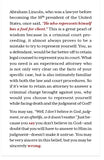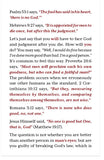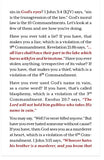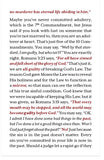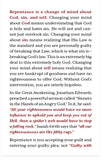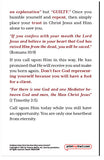Fool For A Client
Special-Order Folded Tract
 NOTE: This item is custom-printed to order (click for more details).
NOTE: This item is custom-printed to order (click for more details).
This tract is from our print-on-demand library, and is not kept in stock. Select the options below, and we will custom-print a batch just for you. Because this item is custom-printed, you can add your custom imprint to the back page at no extra cost.
- Estimated shipping date: Monday, December 1 (Click for more details)
- SKU:
- Discounts: Discount coupons do not apply to this item
- Format: Folded Tract
- Size: 3.5 inches x 5.5 inches
- Pages: 8
- Imprinting: Available with 3 lines of custom text
- Version: NKJV
- Returns: Because this item is custom-printed to order, it cannot be returned.
Show all item details
The full text of this tract is shown below in the NKJV version. (Do you want to print this tract in a different version than the one listed? Contact us and let us know what you're looking for—we may be able to create the alternate version for you at no charge.)
"He who represents himself has a fool for a client."
Abraham Lincoln, who was a lawyer before becoming the 16th president of the United States, once said, “He who represents himself has a fool for client.” This is a great pearl of wisdom because in a criminal court proceeding, it almost always proves to be a mistake to try to represent yourself. You, as a defendant, would be far better off to retain legal counsel to represent you in court. What you need is an experienced attorney who is not only very clear on the facts of your specific case, but is also intimately familiar with both the law and court procedures. So if it’s wise to retain an attorney to answer a criminal charge brought against you, why would you choose to represent yourself while facing death and the judgment of God?
You may say, “Well, I don’t believe in God, judgment, or an afterlife, so it doesn’t matter.” Just because you say you don’t believe in God—and doubt that you will have to answer to Him in judgment—doesn’t make it untrue. You may be very sincere in this belief, but you may be sincerely wrong.
Psalm 53:1 says, “The fool has said in his heart, ‘there is no God.’”
Hebrews 9:27 says, “It is appointed for men to die once, but after this the judgment.”
Let’s just say that you will have to face God and judgment after you die. How will you do? You may say, “Well, I would do fine because I’ve done more good than bad. I’m a good person.” It’s common to feel this way. Proverbs 20:6 says, “Most men will proclaim each his own goodness, but who can find a faithful man?” The problem occurs when we erroneously use other humans as the standard. 2 Corinthians 10:12 says, “But they, measuring themselves by themselves, and comparing themselves among themselves, are not wise.”
Romans 3:12 says, “There is none who does good, no, not one.”
Jesus Himself said, “No one is good but One, that is, God” (Matthew 19:17).
The question is not whether you are better than another person in man’s eyes; but are you guilty of breaking God‘s law, which is sin in God’s eyes? 1 John 3:4 (KJV) says, “sin is the transgression of the law.” God’s moral law is the 10 Commandments. Let’s look at a few of them and see how you’re doing.
Have you ever told a lie? If you have, that makes you a liar, which is a violation of the 9th Commandment. Revelation 21:8b says, “…all liars shall have their part in the lake which burns with fire and brimstone.” Have you ever stolen anything, irrespective of its value? If you have, that makes you a thief, which is a violation of the 8th Commandment.
Have you ever used God’s name in vain, as a curse word? If you have, that’s called blasphemy, which is a violation of the 3rd Commandment. Exodus 20:7 says, “The Lord will not hold him guiltless who takes His name in vain.”
You may say, “Well I’ve never killed anyone.” But have you ever hated someone without cause? If you have, then God sees you as a murderer at heart, which is a violation of the 6th Commandment. 1 John 3:15 says, “Whoever hates his brother is a murderer, and you know that no murderer has eternal life abiding in him.”
Maybe you’ve never committed adultery, which is the 7th Commandment, but Jesus said if you look with lust on someone that you’re not married to, then you are an adulterer at heart. That’s just five of the 10 Commandments. You may say, “Well by that standard, I am guilty, but who isn’t?” You are exactly right. Romans 3:23 says, “For all have sinned and fall short of the glory of God.” That’s just it, we are all guilty of breaking God’s Law. The reason God gave Moses the Law was to reveal His holiness and for the Law to function as a mirror, so that man can see the reflection of his true sinful condition. God knew that we were incapable of keeping His Law, but it was given, as Romans 3:19 says, “That every mouth may be stopped, and all the world may become guilty before God.” You may say, “OK, I admit I have done some bad things in the past, but I’ve done a lot a good things since then. Won’t God just forget about the past?” No! Just because the sin is in the past doesn’t matter. Every sin you’ve committed in your life is now in the past. Should a judge let a rapist go if they said, “But judge, that was in the past—I’ve done a lot of nice things since then”? If he did, then the judge would not be just. The good deeds are irrelevant to the guilt of the crime. For the judge to be a good judge, he must execute judgment on the guilty. God’s standard is much higher than an earthly, human judge. Exodus 34:7 (KJV) says that God “will by no means clear the guilty.” If He just swept sin under the rug, then He would no longer be just and holy. Justice must be served to satisfy the wrath and holiness of God.
The bad news is you are guilty. The good news is God has made one way in which He can legally dismiss your case and yet justice can still be served.
God Himself became a man—He came under the law and kept it perfectly without sin. His sinless blood was shed on your behalf to make an atonement for your sin. Full payment has been made, but in order for it to be applied to your account, you must repent. The original Greek word for repent is metanoia, which means “change of mind.” Repentance is a change of mind about God, sin, and self. Changing your mind about God means understanding that God is holy and hates sin. He will not and cannot just overlook sin. Changing your mind about sin means realizing that His Law is the standard and you are personally guilty of breaking that Law, which is what sin is—breaking God’s law. This is an extremely big deal to this extremely holy God. Changing your mind about self means realizing that you are bankrupt of goodness and have no righteousness to offer God. Without God’s intervention, you are utterly hopeless.
In the Great Awakening, Jonathan Edwards preached a powerful sermon called “Sinners in the Hands of an Angry God.” In it, he said: “All your righteousness would have no more influence to uphold you and keep you out of Hell, than a spider’s web would have to stop a falling rock.” Isaiah 64:6b says that “all our righteousnesses are like filthy rags.”
Repentance is you accepting your guilt and entering your guilty plea; not “Guilty with an explanation” but “GUILTY.” Once you humble yourself and repent, then simply place your trust in Christ Jesus and Him alone to save you.
“If you confess with your mouth the Lord Jesus and believe in your heart that God has raised Him from the dead, you will be saved.” (Romans 10:9)
If you call upon Him in this way, He has promised that He will receive you and make you born again. Don’t face God representing yourself because you will have a fool for a client.
“For there is one God and one Mediator between God and men, the Man Christ Jesus” (1 Timothy 2:5).
Call upon Him today while you still have an opportunity. You are only one heartbeat from eternity.



